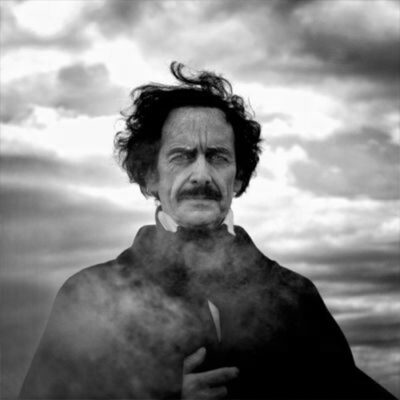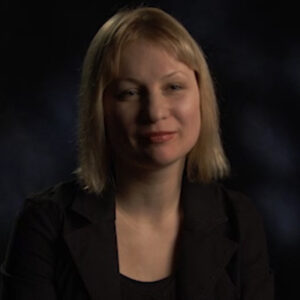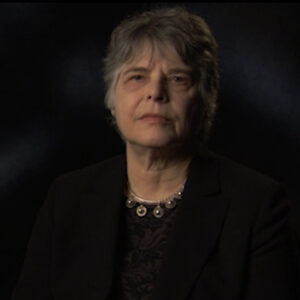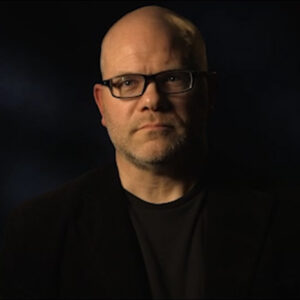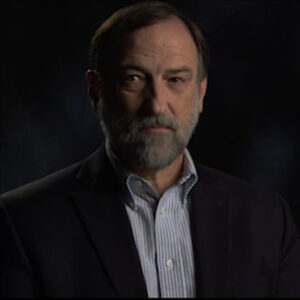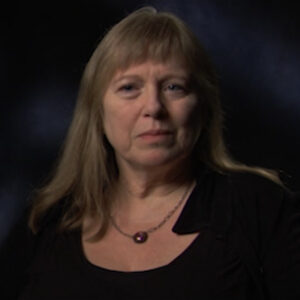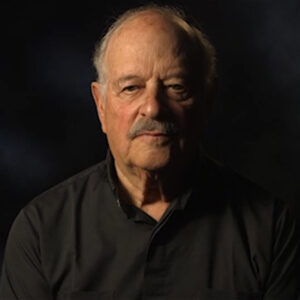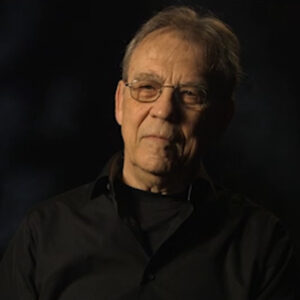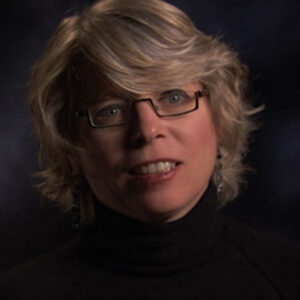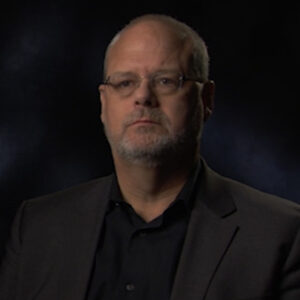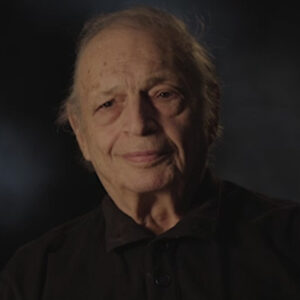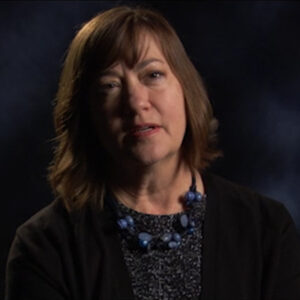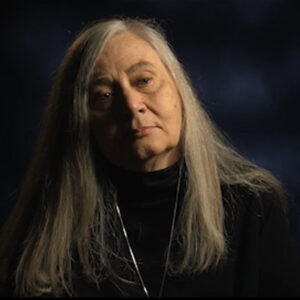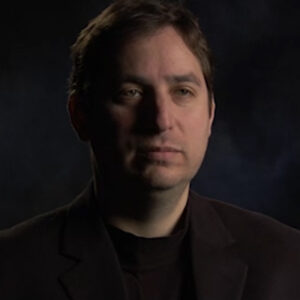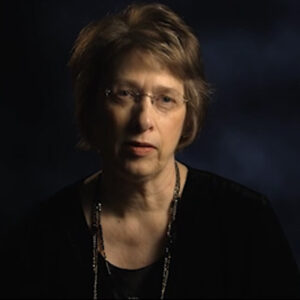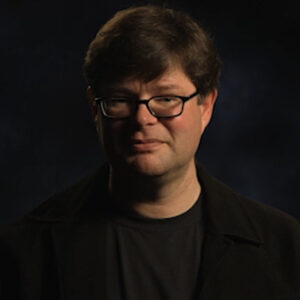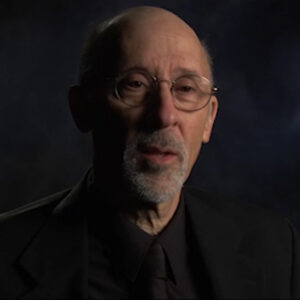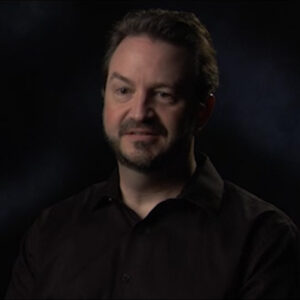Speaker So, Amy, let’s start with the self fashioning thing, and if you could start maybe by saying, you know, from a from a fairly young age, no doubt about it, OK, from a fairly young age, Edgar Poe fancied himself a bit like a Byronic hero.
Speaker He had read a lot of Byron’s poetry.
Speaker He had just started sort of an audio. Oh, sorry. Not that we should have done a test, OK. You could have been OK.
Speaker OK. OK. Uh, whenever you’re ready. I’m a little nervous. Can you just start me with your question? Yeah.
Speaker So, uh, what kind of image did Poe fashion for himself in? When did he start?
Speaker OK, from a very young age, Edgar Allan Poe thought of himself very much like a Byronic hero. He did do some time in London as a student and about six years, I believe. And so he was very influenced by British literature, but he really liked the look of Byron. And in those famous photographs we have of him, he’s dressed very much like Byron with his cravat, the black clothing, that kind of thing. And he also fancied himself to be a Southern gentleman, although he was born in Boston, he lived in Richmond for many years when John Allen brought him in as a foster son. And so he really connected with that society, thought of himself as an aristocrat of sorts. John Allen had quite a bit of money, was a merchant, and and then he went on to West Point. So a lot of lucrative families also went there. So he pretty much kept that look, though, that dark Byronic hero throughout his life. And I think he embraced that Gothic look. It gave him a bit of a mystique. It fascinated the women around him, drew them to him. And and even though often his clothes were shabby, he was always impeccably dressed.
Speaker Yeah, it’s true, you read a lot of these descriptions of, you know, they’d say he’s his clothes were he was very well dressed, except everything was a little red.
Speaker Yes, a little old.
Speaker I’m so still sticking with the young, let’s say, when he’s living in Richmond, working at the Southern Literary Messenger.
Speaker He’s just married his 13 year old cousin. What kind of figure did he cut and what kind of family did they seem like?
Speaker OK, when Powell first worked at the messenger, he wasn’t there long. He wasn’t anywhere very long for employment. He, from what I can gather, is he was working constantly. He was writing constantly and reading constantly. And he was constantly feeling the pressure of being poor, not able to support his family or himself. And so he was negotiating his salary quite a bit. But I do get the sense of this poor guy just locked in an office doing his best to make something out of the small periodical that we had created. And he and it was able to increase its readership seven fold under his editorship. How about your theory about him there?
Speaker Would you feel comfortable talking at all about the domestic side? He and I don’t know a lot about that.
Speaker I don’t do a lot with his brain. So, I mean, I know the facts, but I can do better.
Speaker So in those years. So he’s in Richmond, so he’s in the south still. He’s in the place where he thought he was going to be a member of the upper class, but unfortunately, it didn’t work out that way. What do you think his political sensibilities were at that time, those early days?
Speaker Sure. As a young man, Poe, although he was separated from his family due to his father’s disappearance and his mother’s death, his family had been a leading family in Baltimore. His grandfather had been in the Revolutionary War. And General always referred to you, although he was an actual general who was a minor general and his brother were both wigs. And Poe himself clearly has weakish leanings, especially early in life. He wrote Lampoons on the Jackson administration as well as the Van Buren administration. We can see that in King past. And we can also see that in the Devil, in the Belfry, among some other stories that are not read very often these days. And when he when he moved to the New York area, he got so we’re talking around the early eighteen forties. He sort of did this thing where all of a sudden he joined the young Democrat movement. And a lot of us in post studies think he did this because he was doing what he needed to do to be successful in publishing, not so much that he believed in that young Democrat platform.
Speaker Let’s back up to the still to the Richmond years or even early Philadelphia years, because, you know, imagine you’re talking to eighth graders had no idea what the Whigs are, OK, or the or the Republicans at that point or anybody.
Speaker So if you could give us a more of a sort of bird’s eye view of American politics at that moment and who was allied with Southern interests and who was allied with Jackson and OK, so basically and I’m going to make this very simple because I am not a poly scientist.
Speaker So what I’m what what is going on politically at this time is that the Whig Party is sort of, I would say, analogous to our current Republican Party and that they very much protected people’s property and their assets. They didn’t really think much about educating the rabble in the same way. There was this clear sense of class lines in the Whig Party. So maybe not so much the Republican Party today, but the Whig Party in terms of they were trying to champion classical education. Still, they believe that certain people in society should be in charge of society, people of rank importance, family background, that sort of thing, and and really felt that the wealthy people knew better than the less wealthy people. So some of these elitist ideas were encapsulated in the Whig Party. And this would have appealed to people, because as I’ve mentioned to you, I should say that this would have appealed to Powell because he identified as a Southern gentleman. So he thought of himself as an aristocrat in a sense. And it also appealed to PO because he did not believe in the power of the people.
Speaker This idea of the majority being right. He did not agree with that thought. The majority often misled everyone. If you just followed what everyone else was doing, then you just had a bunch of people doing the wrong thing. Whereas the Democrat Party, especially under Jackson Jackson, came up from a working class background that we might think of today. That kind of background was a military man, had fashioned himself into a leader, but he did not come out of any sort of aristocratic background. And so I would say that that’s the biggest distinction. You sort of have your aristocrats and then your common people. And Jackson became a hero for the common people and as a Southern gentleman would have been siding with the aristocratic notions.
Speaker Yeah, well, let me ask one more thing about what what Andrew Jackson.
Speaker Yes. Kind of represented that he isn’t he considered sort of the first common man. Yes. And before that, all our presidents had been mostly Virginians, some landowners. They were the rich. Yes, yes. And so then what year was the electricity, 18, 30 or 18, 28.
Speaker I mean, he’s the president through the 30s and then you get Bandura at right after. I mean, he served two terms.
Speaker I think it’s twenty eight. I think you’re right. Storms are fast. Yeah. Twenty nine to thirty. So they elected in twenty eight. Yes. So OK, so if you could just start with an eighteen twenty eight. Give you something. How old was Poland. You. He was almost twenty. He was nineteen. So OK you could say when I was about twenty Andrew Jackson was elected president. He was just OK.
Speaker So when Edgar Allan Poe turned 20 years old or almost 20 years old, the president of the United States was Andrew Jackson. And so we had a very different sense of what this country was about. He’s the first president who’s sort of our common man president. Everyone up to that point had come from an illustrious family or they were richer. And the way that Andrew Jackson is going to take the country, PO is not going to agree with most of the ideas there, like many Whigs.
Speaker That work.
Speaker Yeah, OK. Come back and we can go now.
Speaker I can go with the other. OK. Yeah.
Speaker So this whole mob mentality thing, if you give a pretty big, wider context that because I don’t think Americans understand that there were mobs all the time, there were riots in the streets over small and big things in those days.
Speaker And there was this real kind of fear of the unruly crowds.
Speaker I mean, you could talk about in American cities that sometimes I could be here and I want to tell some tales to this, I think.
Speaker Well, I hope so, because you’ve got the man of the crowd and he’s got malintent. You really want me to talk about it?
Speaker I mean, I can, but, yeah, some words with me. Yeah. And so you go. You can. Yeah.
Speaker I want to go with some of those tales or in some of his writing.
Speaker How could you know people knew what he was alluding to.
Speaker OK, I think I can bring that up. The black cat and man of the crowd. OK, yeah.
Speaker So what was going on in American cities in the 18 30s that that was making its way into post stories and that Poe was tapping into?
Speaker OK, once Poe moved to Philadelphia, he became more aware, I believe, in the power of the crowd and what the crowds could mean and the violence that was the violent potential inherent in these crowds. And we had many examples of mob violence, particularly in Philadelphia and the 18 30s. And so in a story like Black Cat, when you see a reference to the gallows, these hangings that would have happened for justice would have brought a lot of people together into a square. And then you can imagine that people didn’t necessarily agree with the crime or the perpetrators or just being in contact with each other, how there would be this sense of tension that the crowd could become a mob. And so this fascinated Poe and created anxiety for Poe, and he explores it in the manner of the crowd, which is a fascinating tale about a gentleman who perceives this man who can’t make sense of in the crowd. And he follows him around for an entire evening trying to decipher it, which he never can. And so this idea of the power of the people frightened him, I think both in terms of their power with the vote to be political about it, but also just the frenetic power they possessed in the city itself. And and I think this is something that came to his mind more when he was up in the north than he would have experienced in smaller cities like Richmond.
Speaker So that was good. OK, thank you. Yeah.
Speaker So he moved from one magazine to another to another. You talk a little about his know why was he doing that? Why was his career so peripatetic? What what what were the reasons will pose?
Speaker Career was peripatetic because he did not get along with people. That’s essentially what was going on. He would be doing well and then he would basically think he should be running the magazine so he would have fights with the owners. He was the editor, or if he wasn’t the chief editor, he would start having arguments with the chief editor. And then a couple of cases he would he would decide he needed to just own the periodical. So eventually that happens with the Broadway Journal. And he thinks, I believe, that if he could just run the show, he would have the best journal. But when he had to listen to someone else, they were holding him back. And obviously that created tension and conflict. And if he had had a little too much to drink and happened to run into one of his bosses, he would tell them maybe some things he shouldn’t have about how he thought about how they were running the magazine and then they would let him go.
Speaker And can you talk to that was good. Talk to you about what kind of critic he was and how that would also.
Speaker Yes. So as a critic, he became known as what was he became known as a tomohiko, started so sorry, got a little hitch there. As a critic, he became known as a Tomahawk critic, which meant he excoriated other writers he had no mercy. He believed firmly that just because they were American, they should not be praised. This was at a time when America was trying very hard to establish its own literary reputation and break away from the British. And so a lot of people, not just editors and other magazines or writers, but just the culture, felt that he should have been more forgiving with some of the things that American writers were doing. But he refused to do this. And so he created some enemies early on, especially against writers in the Northeast and New England, most notably Hawthorne, sorry, most notably Longfellow. They even had a little war. It was called the Poe Longfellow. War occurred through the magazines. PO had accused Longfellow of plagiarizing, plagiarizing Poe of all people. And he would just say, this is not original work. That term original was very important to him.
Speaker And so he would start a ship. I don’t know. Yeah, that original stuff just underscored that.
Speaker Well, that’s the part that term original. Yeah, the term original appears throughout his criticisms. He’s very concerned about American writers not borrowing ideas, words, themes from British writers. And any time he thought he caught wind of that, he would accuse an American writer of plagiarism. Like I said, he use Longfellow not only in plagiarizing himself, but also plagiarizing Tennyson. And he accused Lydia Sigourney, who was a very famous woman writer of the time of plagiarizing Felicia. Heyman’s a British poet.
Speaker And yet Poe himself was not beyond know he plagiarized.
Speaker Can you talk about there was that hypocrisy? Was that just the kind of blindness? What was he doing?
Speaker So when Poe would be criticized for things that he criticized others of doing, let’s say plagiarism, he would often defend himself by saying something to the effect of he made it better. He had the idea. But, you know, that’s an idea that anybody can claim, particularly when he would talk about his Gothic stories. He said terror is not of Germany, but of the soul. So in that way, he was trying to say he was doing something distinctive when actually in a lot of ways he was doing something derivative. Now, that doesn’t mean that his work wasn’t skillful, but it wasn’t new. It was new to Americans, but not new to the world stage and literature. Good things. And I know you want to say, oh, God, you want some water. Yeah. Oh, yeah.
Speaker Okay, so let’s start with like one around the time Pope publishes the Raven, about eighteen forty five. What was the literary scene in New York in terms of women writers and I guess what I’m looking for.
Speaker So what is true is that women writers were actually very successful. Oh, yes, certain. Yes, tastemakers just talked about a lot of financial clout in a way. Oh, yes. And so you have described so so PO finds himself in New York somewhere in the inner circle of success. Who are his and who are his colleagues and contemporaries?
Speaker OK, yes. So around eighteen forty five before and after the success of the rave. And I was hanging out in New York and he’s made friends with a lot of women writers and the famous and lunch is holding. She’s holding her salons and inviting illustrious writers to come speak. But many female writers are there, including Margaret Fuller and in Poe became known sort of for courting these women’s women and Poe became known for courting these women.
Speaker Whoa. I’m an English professor. All right. Yeah, sorry about that.
Speaker Let’s just pause. And I’ve started.
Speaker Poe became known for courting these women. He had flirtations with them both personally, one on one, and also in print. He would publish poems and he would hide their names in the poems, these acrostics and and like he had a poem called A Valentine. And inside that poem, he had encoded somebodies name. So he was flirting with Francis Sergia Osgoode. He was flirting with Elizabeth Smith and Sarah Helen Whitman, of course. And so he and he had endeared himself to them because after the publication of the Ravid, he would come and recite that poem and they sort of swooned over him.
Speaker You cut quite a figure in his Byronic dress and then he would be intoning The Raven and all the beautiful sounds that are inside the raven. And people would report on how he delivered the Raven and the women would write love letters of poems to him, and he would reciprocate that in the press. So he would have sort of these public flirtations as well as private flirtations. He did get himself embroiled at one point in with one of these women. And Margaret Fuller tried to intervene. And I noticed this because Margaret Fuller is also a very famous transcendentalist writer where she will become one with hindsight. And he loathed her and was so resentful that she was trying to get involved in his personal life.
Speaker And tell us a little more about that circle. I mean, just that women actually women writers had importance, the things they dominated the market.
Speaker Sarah I’m sorry, Sarah. Joseph Hill was the editor of Ladies Goatees book. So some of these women were in power, were in positions of great power and start over again.
Speaker So, Sarah, I want to actually do mine stay not with someone’s name, but they say at the time women had. And then you can mention some names if you want, but just start with a more general gotcha, OK?
Speaker At the time Paul was in New York, the women had quite a bit of power. They were publishing regularly and the gift books and then the periodicals. Some of the women, such as Sarah Josepha Hale was the editor of Ladies Goatees book. And so it was in his best interest to ingratiate himself with these women. The people who were reading poetry were primarily familiar with the women writers, not so much the male writers. And so when he could make these connections with these women, he was able to insert his works and in venues where women’s poetry were also being read and you could start to co-op their audiences.
Speaker Interesting. Now, as a critic, how did he treat women writers and poets as a critic?
Speaker Many critics of this time, many male critics, were very careful about how they treated women writers because they did not want to insult the women and they didn’t hold them to the same standard that they held men to. In a notorious review of Lydia Sigourney, he said that she had stolen her work from Felecia humans. And it was interesting because Sigourney wrote him a letter basically saying thank you for criticizing my work. However, I think you went a little too far when you said I plagiarized Felecia humans. I don’t even I did not even know her work yet. And and he wrote in the personal correspondence, almost groveling letters, asking for forgiveness, saying, I did not mean to offend you, Lydia. Sigourney knew his wife, Virginia. They did know each other. Personally, and he could not afford to offend Lydia Sigourney because she was the female poet of the day, and after that experience he would write things in his reviews saying things such as for a female poet, clearly showing that he had a different standard for his criticism when he reviewed women’s works versus male works.
Speaker So the idea that he treated them more seriously than other male critics isn’t really true.
Speaker I don’t believe you want me to say it that way, because I thought I’ve heard some people say that.
Speaker Yeah. So Edgar Allan Poe has a reputation as a critic for being fairly objective. However, when it came to reviewing the women, like many males of his time, he was not nearly as. As critical with them as he would have been with his male counterparts, do you want me to say that again? OK, well, no, if I can’t. OK. Like, OK. Like many male critics of his time, PO was less critical to critical. I’m sorry for not making it true.
Speaker Yeah, I didn’t. Ginger, I know this is good that we’re getting.
Speaker OK, I want to I think you should have that side of your hair down with.
Speaker So how did you how did how or what is the what is the sort of common fallacy about how people treat treated female writers?
Speaker Like many of his contemporary critics, the male contemporary critics, Poe was kinder to the female writers. He had a sense of you didn’t want to insult them. You wanted to encourage them that they were more fragile and therefore they couldn’t take as harsh criticism, although he is often talked about as an objective critic and sort of used the same criteria for all writers in practice and also through his correspondence. This does not seem to be the case.
Speaker And can you say a little bit more about the fact that women writers actually had to they had financial clout, they had market share, that he was a bit jealous of that?
Speaker I don’t know a whole lot of them, so I can’t speak to that as much. Yeah, I’m talking about Sarah Helen Whitman specifically at all. A little bit.
Speaker Yes, the.
Speaker So Sarah Helen Whitman is somebody OK, let me start let me think what I want to say about her. Actually, she’s interesting that anyone talked to you about her statements and all that, but you have but that up mostly after that actors that I’m trying to think that’s kind of what I know her for. I mean, they had that connection. I can’t talk specifically about their alleged romantic connections when he was in New York. I could do better with Elmira Royster. All right. But in Richmond. Yeah, because they become engaged, right? Yeah, he does.
Speaker OK, so, yeah, as I say, other than to say, oh, ok, OK. Well now we don’t need that. OK, yeah. Sorry.
Speaker Well let’s go to Richmond then so. OK, so Poe gets to Richmond, 1848.
Speaker He’s on a tour trying to raise money for Silas. And who does he mean.
Speaker OK, so.
Speaker Around 1840, Edgar Allan Poe heads back to Richmond. He’s on a campaign to raise money for the periodical he has always wanted to own and he’s looking for subscriptions to get us started. The periodical he’s thinking about naming the stylus and he meets Elmira Royster. And Myra Royster was a childhood sweetheart.
Speaker He had been engaged to marry her when he was a very young man. And unfortunately, her father got wind of this and quick married her off to someone else. When Poe had left for school. And so fortunately, she was widowed at this time and they were able to rekindle a romance and they did become engaged.
Speaker How do you think people felt about the engagement?
Speaker I think once Paul was engaged, all Myra Royster, I think it brought a new happiness to his life after the death of Virginia. He was sort of lost and he was having flirtations primarily with women writers and it seemed more show than something authentic. And now he was able to recapture a time before a lot of hardship had entered his life. And I think that was an exciting moment for him.
Speaker Do you know the letter he wrote to his mother in law about his mentioning In My Heart sinks at the thought of marrying her? I don’t know that story about the first time you read the tell tale. Yes. So how did you discover Po?
Speaker OK, so I discovered Po when I was quite young lady. I think I was about 10 or 11 years old and we had in the home a collection of hotels and being and an avid reader. I was just trolling my mom’s bookshelves and came across this collection. And the first tale that I remember reading was The Tell-Tale Heart, and I had never read anything quite like it. It’s not a long story, but it is a powerful story. And what I noticed as I was reading it and getting near the end was my heart was racing, that I was becoming engrossed in the writing technique in addition to the content itself that I would learn to appreciate much later. But all I knew was I had never read anything like this before where I was becoming so engaged, my body was responding to the work, had a frenetic quality that I had just never experienced before.
Speaker Are there other things in power that you find equally engaging?
Speaker Once I started to read Poe a little bit more, I became fascinated with his horror stories, but particularly the graphic ones, we don’t read many of those in high school, probably because they are so graphic. But the black cat is one of the most terrifying stories and one of the most disgusting stories. And Hot Frog is another one. And these stories are fascinating to me because they dovetail into my love for Stephen King and Stephen King is Confessore has confessed that Poe was a great influence on him as well. And also, just what I love about some of Poe’s horror stories is the idea that the the thing that we should fear isn’t some monster out there, but the people in our own circles who are supposed to protect and love us and what it means when they turn against us. And not only do they kill the people in the stories, they will torture their loved ones, even driving them mad. So the sadism, the masochism, all of that that’s in Poe is something that has always fascinated me. And also, there’s always this moral idea at the end that the killer was not in the right, the killer was wrong and the killer will be punished.
Speaker Interesting.
Speaker So what is it that makes Poe still endure a wide like generation after generation?
Speaker I’m a literary scholar, Poe, but what I love about being a poet scholar are all of the people who love Poe, and they are not literary scholars, the people who love spooky Poe, dark romantic Poe, this figure of a man who transgress society. And and although we are upset with Rufus Griswold for the way he wrote the obituary because it did not classify Poe quite right. In reality, it’s that obituary, I think, that has kept Poe alive. And that’s what I love, because, yes, there are elements of truth to what Griswold wrote. So we can’t throw out everything he said. And people are fascinated about the dark side of Poe. And so I love it because it’s an opening for me to talk to my students about Poe and to build upon these mysterious ideas around him. Was he a opium addict? Was he a drunk? Did he marry his 13 year old cousin or are these things true? And they say, yes, but.
Speaker Yeah, that’s but, um.
Speaker So, yeah, I think we do we get it.
Speaker Yeah, we have. I can tell you more about the weather girl thing is the death of would be a political topic. Yeah. Could you could you just start by saying he wrote in one of his essays. OK.
Speaker And, you know, what does that mean?
Speaker For him personally, for his work, so give me just like you want to phrase it and recognize the point of slasher films right from the start, but that’s not right.
Speaker So let me let me address that then.
Speaker Yes, ok. OK.
Speaker Pao is notorious for coming up with this idea in his works to kill off a beautiful woman in the philosophy of composition, which she wrote to discuss what inspired the Raven. This is where he came up with this idea. But what many people don’t include is the next part of the quotation. So there’s this idea that the most poetical topic is the death of a beautiful woman. But the very next part says bereaved by her lover. And I think that’s really important because it’s not just I need to kill off a woman to make a good horror story. It’s now I need to go through the process of what it means to be the man left after the death of this beautiful woman and how that man cannot then not let go of her. And that idea really applies more to his poems like Annabel Lee Lulu, than really using it to apply to the stories.
Speaker OK, yes, that does. I mean, maybe just one more question about this, so.
Speaker Maybe if you could talk a little bit about how, you know, today we like to a lot of people just see the horror, the horror, but there’s so much more, I’m sure.
Speaker I think what I want to mention is this so much more because of there, but today people often think about PO in terms of his poem, The Raven and in terms of his horror stories, follow the house of Usher, William Wohlsen, Black Cat Lijia. But what they don’t recognize is how funny he is.
Speaker He is hilarious. It is a dark humor granted to this day. I think The Cask of Amontillado is one of the funniest stories ever written with all of its puns. He was also incredibly intelligent and calculating in his works. And so the detective fiction combines both the horror element but also the use of reason and intuition and are very different in tone than those horror stories. And he also has hoaxes and those are really fun to read. Like Mozart’s chess player and the unparalleled adventure of one hands fall. And those works inspired the sci fi genre. And I hope that he will be remembered for being multifaceted rather than just this Gothic writer.
Speaker Yeah, good, good. OK, thank you. Yes.

